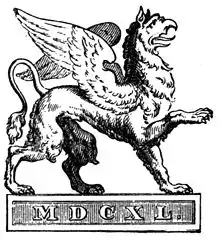griffin
See also: Griffin
English
Etymology
From Middle English griffoun, from Old French griffon, from Latin gryphus, from Ancient Greek γρύψ (grúps).
Pronunciation
- IPA(key): /ɡɹɪfɪn/
Audio (Southern England) (file)
- Rhymes: -ɪfɪn
Noun

a griffin (1)
griffin (plural griffins)
- A mythical beast having the body of a lion and the wings and head of an eagle.
- A large vulture (Gyps fulvus) found in the mountainous parts of Southern Europe, North Africa, and Asia Minor, supposed to be the "eagle" of the Bible.
- An English variety of apple.
- (dated, India) A person who has just arrived from Europe.
- 1842, The Asiatic journal and monthly register, volume 38, page 40:
- Tables were laid out in the palace, profusely covered with wines and refreshments, in the European style; old hands and griffins, fair sex and civilians, seemed all determined to enjoy themselves […]
- A cadet newly arrived in British India: half English, half Indian.[1]
- A watchful guardian, especially a duenna in charge of a young woman.
Derived terms
Descendants
- Chinese Pidgin English: griffin
Translations
mythical beast having the body of a lion and the wings and head of an eagle
|
Anagrams
Chinese Pidgin English
Noun
griffin
- A person who had spent less than a year in China.
- A racing pony in its first season.
References
- Gow, W. S. P. (1924) Gow’s Guide to Shanghai, 1924: A Complete, Concise and Accurate Handbook of the City and District, Especially Compiled for the Use of Tourists and Commercial Visitors to the Far East, Shanghai, page 105: “Griffin: (Anglo-Indian) a newcomer. One with less than a years’[sic] residence in China. Also a racing pony in his first season. (“China ponies” are bred in Mongolia and brought down annually).”
This article is issued from Wiktionary. The text is licensed under Creative Commons - Attribution - Sharealike. Additional terms may apply for the media files.